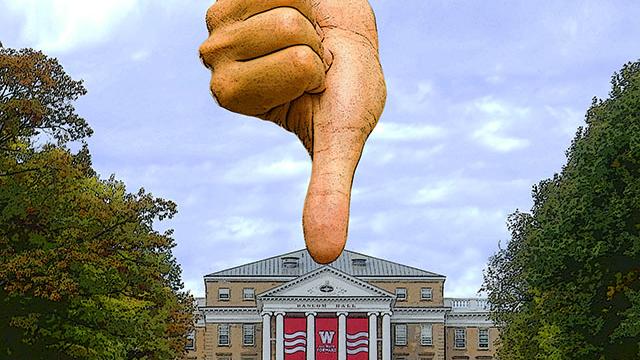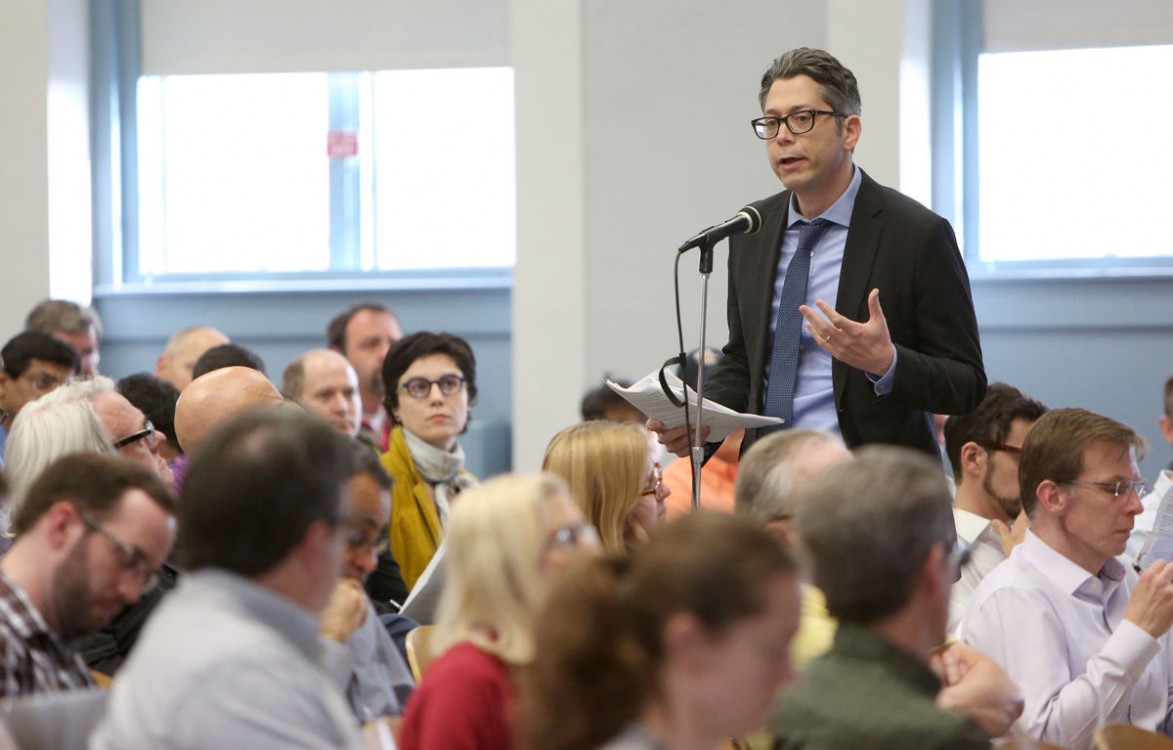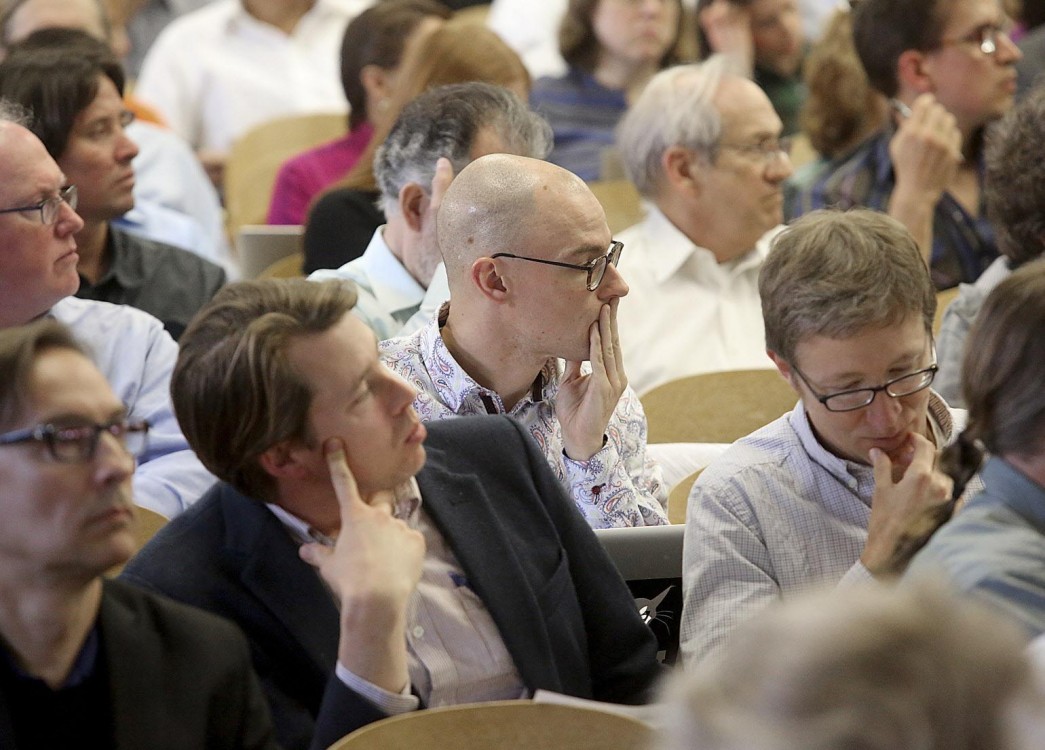
It should come as no surprise that Wisconsin remains at the cutting edge of higher education “reforms.” Casual observers might recall the steady stream of attacks on the University of Wisconsin System and public-sector unions, which stripped unions of collective bargaining rights in 2011 while cutting public employee pay by nearly 7 percent. Governor Scott Walker, in office for just six weeks at the time, packaged the austerity measures under the guise of promoting “the state’s workforce needs,” and has since cut more than a quarter of a billion dollars from the system while simultaneously freezing tuition.
Despite the massive protests that followed those budget cuts, the state's battle against its own university system has met little public resistance in recent years. Recent amendments to Wisconsin's tenure laws, however, have led to a new outcry. The fresh attention comes courtesy of the state’s decision to include new financial considerations in the tenure laws, including provisions for increased flexibility in hiring and firing.
This seemingly innocuous power over employment represents an enormous expansion of power for the UW Board of Regents. The 18-member board, with 16 members directly appointed by the Walker administration, can now dismiss faculty “when such an action is deemed necessary due to a budget or program decision requiring program discontinuance, curtailment, modification or redirection.”
The purposely vague appropriation of power hits all the notes of corporate efficiency: the rule seeks to increase university flexibility and adaptability, bringing retail logic to the university system. In other words, professors in profitable departments can stay. Everyone else, not necessarily.
But the growing disparity in power between faculty and regents hasn’t escaped the notice, or ire, of professors within the system. This spring, professors and faculty across the state voted to declare “no confidence” in the UW System president and Board of Regents. As of June 1, the faculties of seven of the state’s 13 four-year universities had voiced their dissent, including the two largest universities in the state, UW-Madison and UW-Milwaukee.
No-confidence votes are largely symbolic, though. As Kevin Kiley wrote for Inside Higher Ed, “The main power of no-confidence votes is the power to shift opinion, either that of the institution’s governing board or of the general public.” And that is exactly the idea in Wisconsin, where the votes constitute an attempt by the university faculties to draw attention to their dilemma, garnering whatever public support remains for them after years of state-sanctioned assault.
Their approach is not without obvious risks. Even as professors nationwide reach out directly to the public to explain the importance of tenure and job security, to defend the value of their work, and to propose their own alternatives to traditional tenure models, state representatives are taking their talking points and turning them into polished sound bites.
As a result, in Wisconsin, the professors’ dissent has sparked a culture war. While the language of the state’s tenure changes sounds straightforward and impersonal on paper, the response to the no-confidence votes has been quite the opposite. One state representative called the professors' position “a hissy fit to some pretty minor changes,” while another described the faculty as “backhanding the middle class families who are pleading for controls on tuition and an end to wasteful spending.”
Still another, State Rep. Robin Vos, retreated to right-wing media to argue that tenure represents “a job for life,” which is unacceptable when “this type of job security job is nonexistent in the real world.” What Rep. Vos may not realize is that the type of job security he is referring to has diminished rapidly thanks in part to the policies he and his colleagues in the state have promoted.
Just as Gov. Walker’s Act 10 dismantled the security and stability of union protection in K-12 education, so too have the tenure changes dismantled the procedures and by-laws that ensure a fair hiring and firing process. The University of Minnesota, for instance, dictatesthat “removal or suspension from office or censure or other penalty must not be based upon any belief, expression or conduct protected by law or by the principles of academic freedom.”
That kind of job security has been thoroughly forgotten in Wisconsin. And so long as universities like Minnesota exist – ones that maintain the protections of academic freedom and job security – the effect of Wisconsin’s recent spat will continue to resonate. Just as Act 10 led to a prolonged – and ongoing – teacher shortage in Wisconsin, so it seems the changes to tenure have sparked an exodus of faculty in search of greener pastures.
The recent trends toward corporatization, however, makes the future of U.S. higher education more tenuous by the day. While the UW System is one of the few university systems to gut tenure, the playbook – to cut budgets and job protections and effectively treat professors like seasonal employees – is becoming increasingly common. North Carolina, for instance, proposed a bill to mandate ridiculously heavy teaching loads for professors, while Illinois is holding its universities hostage over an anti-union, pro-business budget that shows no promise of passing.
Wisconsin, then, represents a cautionary tale. Despite its progressive past, the state's representatives are seemingly unable to recall its rich history of union activism, anti-trust legislation and higher education investment. So even as the Democratic Party embraces the challenge of fixing the ailing UW System – largely by increasing federal funding – state universities are being dismantled and corporatized. By the time November arrives, future efforts may have to shift from rethinking the university systems to rebuilding them. With luck, there might still be some professors left.
3 WAYS TO SHOW YOUR SUPPORT
- Log in to post comments

















